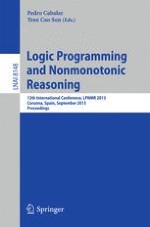This volume contains the refereed proceedings of the 12th International Conference on Logic Programming and Nonmonotonic Reasoning, LPNMR 2013, held in September 2013 in Corunna, Spain. The 34 revised full papers (22 technical papers, 9 application description, and 3 system descriptions) and 19 short papers (11 technical papers, 3 application descriptions, and 5 system descriptions) presented together with 2 invited talks, were carefully reviewed and selected from 91 submissions. Being a forum for exchanging ideas on declarative logic programming, nonmonotonic reasoning, and knowledge representation, the conference aims to facilitate interactions between those researchers and practitioners interested in the design and implementation of logic-based programming languages and database systems, and those who work in the area of knowledge representation and nonmonotonic reasoning.
